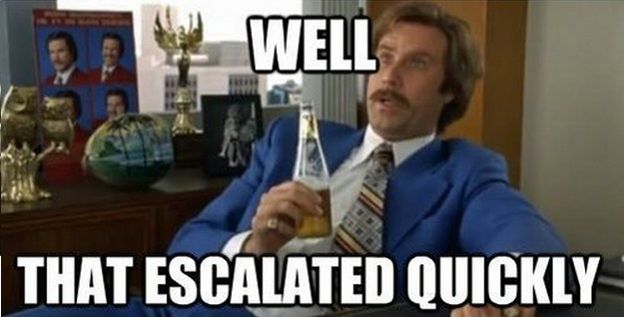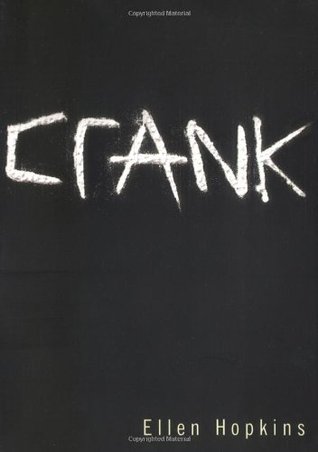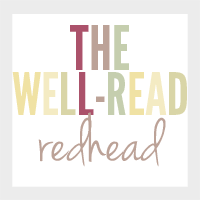Title: Go Ask Alice
Author: Anonymous (Beatrice Sparks)
Publisher: Simon Pulse
Publication Date: September 14, 1971
Source: borrowed from the good ol' public library
Plot Summary from Goodreads:
It started when she was served a soft drink laced with LSD in a dangerous party game. Within months, she was hooked, trapped in a downward spiral that took her from her comfortable home and loving family to the mean streets of an unforgiving city. It was a journey that would rob her of her innocence, her youth -- and ultimately her life.
Read her diary.
Enter her world.
You will never forget her.
For thirty-five years, the acclaimed, bestselling first-person account of a teenage girl's harrowing decent into the nightmarish world of drugs has left an indelible mark on generations of teen readers. As powerful -- and as timely -- today as ever, Go Ask Alice remains the definitive book on the horrors of addiction.
My Review:
That's right, it's one of my favorite literary weeks--BANNED BOOK WEEK! During this event each year, Sheila at Book Journey hosts a little celebration on her blog, and this is the third year that I am participating. It's a great excuse to explore the world of banned books and read some good ol' blacklisted literature. You can check out my Banned Books Week reviews from the last two years here: Flowers for Algernon and One Flew Over the Cuckoo's Nest . READ ALL THE BOOKS!
Alrighty, let's pipe down and review Go Ask Alice. This book has been on my TBR for years--so many years that I finally added it to my "30 Before 35" list last year, in an effort to make sure I finally read it. I thought the premise sounded interesting, especially because the diary was reportedly written by an actual anonymous teenager who suffered through a drug addiction. This reminded me a lot of Crank by Ellen Hopkins (a fiction novel based on her daughter's real-life drug problems), and I was eager to get a different perspective on this issue.
However, pretty early in the book, I started to feel like something was a bit off. Alice (the protagonist) was awfully preachy and introspective for someone with such a serious addiction. On the days when she was sober, she was quick to reprimand herself for her behavior, and to explore the many moral ramifications of her actions. This seemed unusual, given the tone of other addiction memoirs I have read. At first, I chalked it up to the influences of a different era (this book is from 40 years ago, after all). But then I was also a bit bothered because Alice's drug encounters always escalated so fast. It was never just her getting high with her friends. It was "I got high, and then I also got raped, and then suddenly I was selling LSD to 9-year-olds."
I don't doubt that these types of things can happen when people truly sink into addiction, but for Alice, it was pretty constant to the point of feeling farfetched.
Finally, some Googling put this in a clearer perspective. Apparently the author of Go Ask Alice isn't very anonymous at all--the author is Beatrice Sparks, who at the time of the book's release was a social worker and member of the Mormon faith (she has since passed away). She was originally credited as just an "editor" of the book, but after some questions arose regarding the true identity of "Alice", it became clear that much of the book was written by Sparks herself. Hence, preachy tone and conveniently trumped-up circumstances, meant to warn impressionable teens of the dangers of drugs. (You can read more about the Sparks allegations here,)
After delving into that information, the often-banned status of Go Ask Alice became even more interesting to me. Because first: why would parents and teachers want this book banned, if it's entire purpose is to warn teens away from drugs? I suppose they're taking the abstinence approach--if we don't talk about drugs or sex or alcohol, then they'll just never do them! (Yeah, let me know how that works out for you.) And second: isn't it intriguing that this book was banned for drug/sex/etc references, when the REAL crime here is the authenticity of the writing? It seems rather criminal to me that this is sold to teens as a real girl's diary, when in fact it is the work of a 40-something youth counselor. Teens today are pretty savvy, and I'm guessing that many of them could see right through this writing.
Despite the crime against literary humanity that Sparks committed here, of course I (as always) feel that this book should not be banned. There are other tales of drug addiction, written with more authenticity, that would be more likely to get through to modern-day teenagers. However, the basic intent of this book (to show kids a "worst case scenario" for such behavior) is admirable, and if it keeps even a few teens away from these poor choices, then who can argue?
Without further ado, it's GIVEAWAY TIME! Let's celebrate banned books together! Just fill out the Rafflecopter below, and you'll be entered to win a copy of the banned book of your choice (from this list, limit of $15). Giveaway is international, as I will be shipping through Book Depository. Good luck!
a Rafflecopter giveaway













